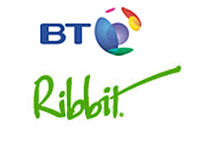 BT, the dominant British telecommunications company, has acquired Ribbit, a company that has styled itself “Silicon Valley’s first phone company,” for $105 million.
BT, the dominant British telecommunications company, has acquired Ribbit, a company that has styled itself “Silicon Valley’s first phone company,” for $105 million.
VentureBeat first heard news of the deal in July and reported it. At the time, the company’s spokesman Don Thorson adamantly denied that any deal had happened, but it was clear something was up. Today, the company confirmed the amount of the deal.
This is an impressive performance for Ribbit, which first launched in January. In a day when there are hundreds of VoIP companies struggling to be heard above the noise, Ribbit came along and showed how success is still possible — if you’ve got deep technology, and put together a sharp team.
Mountain View, Calif.-based Ribbit’s software lets you make a phone call from a web page, or direct your own phone calls to a web page. It includes ways for you to do things like transcribe these calls into text, that you can then search. More importantly, however, the company launched in December a platform for developers who want to build Ribbit’s features into any other application — including a way to sale the phone applications to large companies.
Notably, Ribbit built voice services for online business software company Salesforce, which includes the first service that combines mobile voice automation and so-called software-as-a-service. Ribbit released a consumer-facing product called Amphibian.
 We should note the seven month launch-to-sale was deceptively simple. The company was actually built upon years of prior work of its founders, Ted Griggs and Crick Waters. At an earlier venture, Griggs (pictured left) had built a “soft switch” for the phone service that underpinned Ribbit. They brought in AT&T and Sprint executives, and then married that experience with the Web 2.0 magic from engineers they lured from Yahoo and EBay.
We should note the seven month launch-to-sale was deceptively simple. The company was actually built upon years of prior work of its founders, Ted Griggs and Crick Waters. At an earlier venture, Griggs (pictured left) had built a “soft switch” for the phone service that underpinned Ribbit. They brought in AT&T and Sprint executives, and then married that experience with the Web 2.0 magic from engineers they lured from Yahoo and EBay.
The company had raised only $13 million over the past two years. It included $10 million in a second round of capital led by Allegis Capital, with KPG Ventures participating, and before that, $3 million in first round funding from Alsop Louie Partners. It’s a nice win for Alsop Louie, a relatively new fund, which was earliest into the deal, and therefore earned the highest multiple.
Ribbit will continue to be operated independently, but will be a fully owned subsidiary of BT. The move continues an effort by BT to move into other sectors, i.e,, to make money from other services than from pure phone calls.
Thorson said he was forced to deny the initial rumors becuase a deal hadn’t been completed, and because the London stock exchange takes a dim view of deals that are leaked before they’re finalized.
Update: Anthony Ha here. I just got off the phone with Griggs and JP Rangaswami, BT’s managing director of service design. Both of them emphasized that Ribbit fits into BT’s larger goal to transform itself into a next-generation telecommunications company — as Matt notes above, BT wants to move beyond just providing the “pipes” for phone calls, and enabling voice features in any software application is an important component of that. As Rangaswami put it, this “raises the ante in the overall communications platform race.”
For Ribbit, on the other hand, Griggs says BT offers a “firehose” of opportunities, starting with BT’s 21CN network.
When the possibility of an acquisition came up, Griggs says Ribbit was already looking for a global partner and considering a third round of venture funding. The companies’ similar visions, plus the fact that BT wanted Ribbit to stay autonomous, sweetened the deal.
VentureBeat's mission is to be a digital town square for technical decision-makers to gain knowledge about transformative enterprise technology and transact. Learn More
